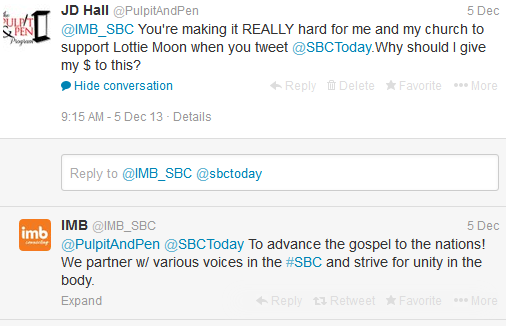Earlier, I posted an article dealing with the propensity of Southern Baptist leaders to stay quiet on controversy and why some feel the need to rebuke those that rebuke, but not those that sin [click here for link]. Keep in mind that to my knowledge (send me a link if I’m wrong), not a single Southern Baptist leader has provided commentary on Brewton-Parker College hiring an unrepentant and possibly unconverted man as their new president or suggested any type of concern for the testimony of Southern Baptists toward the lost world, the Muslim world, or any other segment of society that values integrity. I’m looking for just one.
Thankfully, former 2nd VP of the SBC, Dave Miller, provides his assertion that the Ergun Caner dibacle is none of the business of Southern Baptists or other concerned evangelicals in his article, “It’s None of My Business!” [Click here for link] Miller provides the following six reasons for why it’s none of his (and by clear inference, our) business.
1) Some have claimed it is our duty to publicly address false teachers. If Ergun Caner was promoting doctrines contrary to the gospel (and my people were aware of those doctrines), I would address them for their protection. But, while Caner has been somewhat forceful (to be kind) in his confrontation of Calvinism, he holds to the biblical gospel and is part of the family. I’ve not heard anyone accuse him of heterodoxy, only heteropraxy [Dave Miller].
It seems that Miller is arguing that to be a false teacher, your doctrinal statement has to be askew. Read what the Gospel Coalition website says about how to spot a false teacher:
Peter says, “We did not follow cleverly invented stories when we told you about the power and coming of our Lord Jesus Christ” (1:16). And then he says the false teachers exploit you “with stories they have made up” (2:3). So the true teacher sources what he says from the Bible. The false teacher relies on his own creativity. He makes up his own message [Colin Smith – click here for link].
Imagine if Paul were to give a false account of his conversion to the people of Galatians. Paul confirms himself as a true apostolic teacher with the following testimony:
For you have heard of my former life in Judaism, how I persecuted the church of God violently and tried to destroy it. And I was advancing in Judaism beyond many of my own age among my people, so extremely zealous was I for the traditions of my fathers. But when he who had set me apart before I was born, and who called me by his grace, was pleased to reveal his Son to me, in order that I might preach him among the Gentiles, I did not immediately consult with anyone; nor did I go up to Jerusalem to those who were apostles before me, but I went away into Arabia, and returned again to Damascus. (Galatians 1:13-17, ESV).
Because his credibility had been attacked by the Judaizers, Paul had to reinforce his testimony to the Galatian church to prove he was a true teacher, sent by Jesus. Imagine if the Galatian church found out that Paul’s testimony and life story was fabricated; that he had only visited the Jewish people in one or two undocumented vacations to Jerusalem, that Jesus never visited Paul on the road to Damascus because Paul was actually never in Damascus and never even took the road there. Imagine the Galatians discovering that Paul never preached to the Gentiles, that he never went away into Arabia, that the other Apostles that he later claimed to have met with he never met with. The Galatians would have been just in calling Paul a false teacher, regardless of whether or not his lies were about the Gospel. Lies are lies, and this is what Jesus had to say about those who lie:
You are of your father the devil, and your will is to do your father’s desires. He was a murderer from the beginning, and does not stand in the truth, because there is no truth in him. When he lies, he speaks out of his own character, for he is a liar and the father of lies (John 8:44, ESV).
It seems that Miller’s bar for the false-teacher label is set a little lower than that of Scripture.You see, to speak lies, to “invent stories” as the Apostle calls it, testifies of the teacher’s motivation and calling.
2) Some have appealed to our relationship as part of the SBC. But the SBC is connectional, not hierarchical. I have a kinship with (some) Georgia Baptists, but I am not part of them. We support missions together through the Cooperative Program, but that does not give me a voice in Georgia Baptist affairs [Dave Miller].
This is among the most popular of excuses used by Convention officials (and pretty much everybody else in world history that should’ve acted, should’ve spoken up, but didn’t). It’s the “that’s not my jurisdiction” argument. Miller says that the SBC is “connectional, not hierarchical” and that’s true. What’s the point? No one is asking our Southern Baptist leaders to come in and coup d’etat Brewton-Parker. What we want them to do is exercise their God-given right to speak up and say something…anything, really. This is the same type of nonchalant cowardice and unconquerable apathy that has led to countless tragedies taking place across the world while good people stand silent. The fact is, these types of things are done in Southern Baptist circles (Joe Aguillard’s Final Solution at Louisiana College is another example) because the parties involved know full well that there exists this unspoken rule not to speak.This is really the default position of worldly wisdom, “see no evil, hear no evil, speak no evil.”
But Miller might just be onto something, in that he says “we support missions together through the Cooperative Program.” When I tweeted the IMB and asked them why I should support support Lottie Moon when they quote Emir Caner’s blog, the IMB tweeted back, “To Advance the Gospel to the Nations! We partner with various voices in the SBC and strive for unity in the body!”

According to the International Mission Board of the SBC, the Caner Brothers and their two institutions are part of our ‘body.’ Would Dave Miller disagree with the IMB on this? Obviously, in one sense the Caners are not in our body (within the spectrum of the local and autonomous church). But in another sense, the sense in which the IMB speaks, they are in our body. The truth is, the fact that we as Southern Baptists cooperate with one another doesn’t lesson the impact or responsibility we have to maintain institutional uprightness for the good of our partnered testimony. And, of course, my answer to the IMB was the same as my response to Dave Miller:
Do not be unequally yoked with unbelievers. For what partnership has righteousness with lawlessness? Or what fellowship has light with darkness? What accord has Christ with Belial? Or what portion does a believer share with an unbeliever? (2 Corinthians 6:14, ESV)
Miller continues…
3) Some have referenced biblical mandates to publicly rebuke sinners – and there are certainly such verses. But I would argue that the context of those verses indicates that the forum for such verses is primarily the local church. Again, if Caner had some impact on my local church, I would warn them and perhaps confront him. But he doesn’t, so I won’t.
The context of those passages does not provide a general warrant for every Christian to public rehearse every opinion he has on every subject.[Dave Miller]
First, let’s strike out the Red Herring in the last sentence. No one is arguing that we should publicly rehearse every opinion on every subject. I, for one, don’t care what you ate for supper last night and I sure don’t want to see a picture of it on Facebook. I don’t watch college sports and if you post a play-by-play on Twitter, I’m going to block you. Neither has anyone argued (that I’m aware of) that it’s profitable to post every opinion on every spiritual subject. I haven’t commented on a certain pastor recently accused of plagiarism – other people seem to be on that. I don’t talk about eschatology unless I’m somehow tricked into the conversation. Miller says that if Caner has an impact on his local church, he would warn them and confront him. I wish that Miller could see that Caner does have an impact outside his own geographical circle.
I’m in Montana. I’m surrounded on all sides by people who think of slavery and racism when they think of the SBC. And if they think Baptist in general, their exposure to us is so rare that they think we handle snakes and our choir dances. It’s not as easy outside the Bible Belt where you can’t just put up a church sign that says “SBC” and have people come to church solely on that virtue. And yet there are believers, and solid believers around us. There are Masters College and seminary grads and a good number of them in the area. There’s a healthy percentage of other denominations and independent Bible churches that share the majority of our doctrinal commitments. These people listen to Christian radio and spend time in the Marketplace of Ideas. They know Ergun Caner; and they cannot believe the SBC is as foolish as it is to give the man a second glance. You see, they don’t care about the division between the Georgia Baptist Convention and the SBC. They don’t know it, and they don’t care. To them, it’s the SBC. And my church is one like countless others that slowly and discreetly took “SBC” off the sign outside.
The other way it matters is to the Muslim world. Hiring Caner as the president of a Baptist college really is an act of aggression toward Muslims. I’ve heard someone say in a Southern Baptist Sunday School class (after September 11, 2011), “Let’s just nuke ’em all, the whole country” in reference to Muslims (who apparently they thought all Muslims live in single country called ‘Muslimistan’ or something). It’s that type of attitude that says callously, “we don’t care what the Muslims think.” I greatly care what the Muslims think, because I want to see them won for Christ. I don’t care two cents if they think we’re crazy or stupid for believing the Gospel. I care if they think we’re hypocritical and unrepentant sinners who only hold to our confessions superficially, because that is a reproach to the Gospel. And that’s exactly what Brewton-Parker’s new president has become; a reproach to the Gospel.
4) We have forgotten the biblical context of confrontation and rebuke. Two elements seem to be required for rebuke in scripture – relationship and authority. Rebuke in the NT is generally a product of authority. You never see the church at Ephesus issuing a proclamation confronting sin in Corinth. Paul, an apostle, having apostolic authority over the church, issued rebuke. Paul instructed local pastor/elders, Timothy and Titus, who had pastoral authority, to rebuke and correct. They had the right and responsibility to do so. But they were not issuing public proclamations about events a thousand miles away!
There is another element – relationship. Remember the words of Jesus to the lukewarm church of Laodicea? ”Those whom I love, I reprove and discipline, so be zealous and repent.” (Rev 3:19) I rebuke my children. I publicly rebuke charlatans like Joel Osteen to my people, and am responsible to rebuke sin in the lives of my people needed. I have a relationship that gives me a forum for such. [Dave Miller]
First, don’t fall for the distraction on Miller’s part. Most of the conversation about Caner is not an attempt to rebuke him personally, but to (1) warn Christians about Caner and (2) to vent grave concern for the state of affairs in Baptist life. The Internet, social media, and the like are today’s Marketplace of Ideas. They are our gates of the city. They are our steps of the synagogue, our Solomon’s portico, our School of Tyrannus. Obviously most of what we see in apostolic letters written to local churches are within the context of local churches. But understand that in a day and time without a 24 hour news service, putting rebuke into a letter that was meant to be publicly read and distributed (not to mention that the Holy Spirit inspired to be included in the best-selling book of all time), this was the most public rebuke that the apostles could have engaged in. Letters meant for the aforementioned purposes were the blinking billboards of the ancient Near East.
Furthermore, Miller’s interpretation of Revelation 3:9 is wrong. There’s no reason to believe that Jesus had ever visited or known personally anyone in the church of Laodicea. He didn’t rebuke them because of his personal, loving relationship that he acquired for his years walking the dust of the earth together. Rather, his rebuke was evidence of his love for the church as a whole. We see that Miller’s reading of Revelation 3 is contradicted by the Paul’s rebuke to the fornicating man (and the church that refused to rebuke him) in 1st Corinthians 5. Paul clearly did not know the man personally and yet his sin was so public and so agregious it warranted rebuke from afar.
5) Vengeance is mine, I will repay! To all who are about to become former friends, let me wish you well and tell you I still love you! But while the rebuke of Caner is generally presented as a noble effort to confront sin in the church and protect the purity of the church, I suspect that something more than that may be at work – at least in some circles. I’m not making a blanket accusation, but am certainly making an observation.
Get this…this is rich. Miller, using suggestive, unprovable, subjective suspicion rebukes those who rebuke the actions of Caner using recorded, demonstrable and objective evidence. We can prove Caner lied – easily. We have it on videotape. And yet, Miller uses a subjective feeling he has about the hidden intentions of a man’s heart to rebuke those calling Caner to repentance. Does this smell rotten to anybody else? This is the epitome of hypocrisy. The argument of Caner’s defenders is that the evidence was discovered and then disseminated by Calvinists and Muslims.That’s mostly true. It’s true because both groups have been castigated and unfairly treated by Caner, and these groups were the ones with whom he was interacting and happened to tell the lies about (particularly Muslims). But what’s the point? Facts are objective. Facts are facts. This is called deflection. If Miller can produce some kind of evidence (the kind of evidence that’s been provided about Ergun Caner will suffice) that the intentions of the hearts of all the people calling Caner to repentance are evil, please produce it. If not, let’s bathe in the ironic hypocrisy.
6) Is there not some value in private instead of public rebuke? I know that many have argued (convincingly to me) that Matthew 18:15 does not directly apply to blogging. If I want to confront something someone has said publicly, I am not required to do so in private first. But, there is a value in making personal confrontation private. I could write a letter to the trustees of Brewton-Parker (which would likely land in the circular file). I could voice an opinion to the Georgia Baptist Convention, if someone would take my call. Private rebuke is better than public, most of the time. It is more likely to bring resolution. [Dave Miller]
Once again, Miller is assuming that Caner hasn’t been privately approached by dozens, hundreds or perhaps even thousands of people who’ve been horrified by his lies and subsequent lack of repentance. I would urge Miller to write a letter to Caner and see what kind of response he gets. But in return, I would ask Miller, “Is there not some value in public accountability and true integrity?”
You see, it doesn’t take integrity to call outsiders to repentance. The lost and heathen world acts lost and heathen; it’s really to be expected. Yet a quick survey of the blogs of Southern Baptist leaders and you’ll find them trying to slay one secular dragon or another outside the denominational gates. A Supreme Court decision or anti-Christmas news story and they’ll get all worked up into a frenzy. The world looks at this and wonders if we’re serious. And then they see Ergun Caner elected president of a Southern Baptist college and they see that clearly we’re not serious. That’s not integrity, it’s a shame. Is the integrity of your convention “your business”? I would suspect it is.












